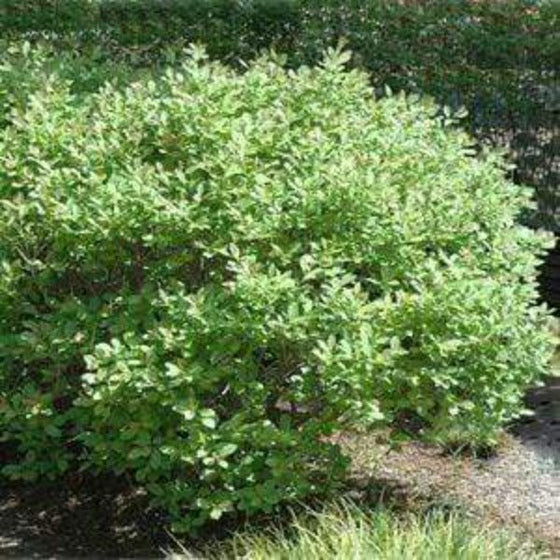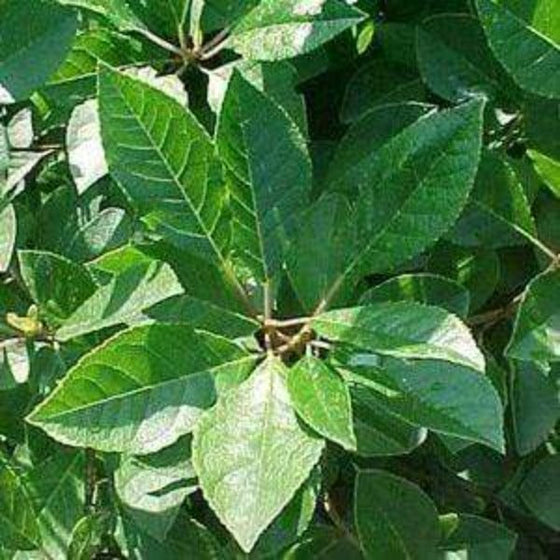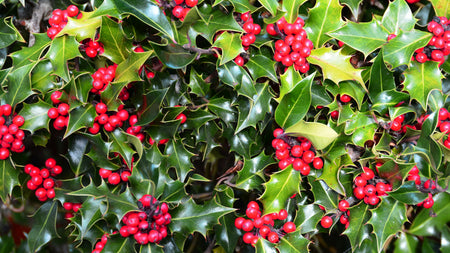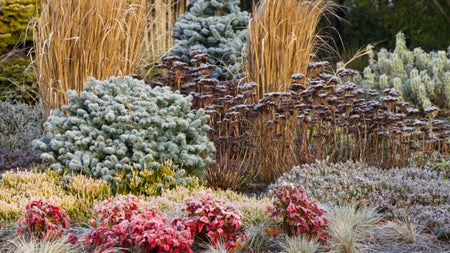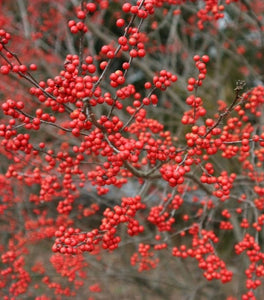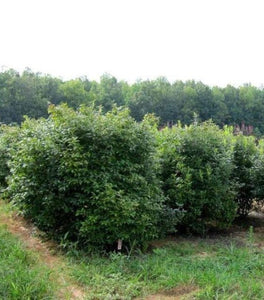
Images Depict Mature Plants
Jim Dandy Winterberry Holly Shrubs for Sale Online
Jim Dandy Winterberry Holly (Ilex verticillata 'Jim Dandy') is a compact, deciduous male holly known for its essential role as a pollinator for female winterberry varieties, such as Red Sprite and Berry Heavy. This versatile shrub grows to a height of 3 to 6 feet, with a similar spread, and is ideal for use in mixed borders, foundation plantings, or as a companion plant in naturalized settings. While Jim Dandy does not produce berries, it offers glossy green foliage and inconspicuous white flowers in late spring, adding subtle charm to the garden. Its primary function is to ensure abundant berry production in nearby female winterberry hollies, making it an indispensable addition to your landscape.
Jim Dandy Winterberry Holly thrives in USDA zones 4-8 and prefers full sun to partial shade for optimal growth. It is well-suited for wet soils and can tolerate areas prone to periodic flooding, making it an ideal choice for rain gardens, boggy areas, or planting along pond edges. The shrub performs best in slightly acidic, well-drained soil, which helps promote lush, healthy foliage and successful pollination of female hollies. Since Jim Dandy blooms at the same time as the female winterberry varieties it is meant to pollinate, planting it within 50 feet of female varieties like Red Sprite ensures effective cross-pollination and maximizes berry production in the garden.
In addition to its vital role in pollination, Jim Dandy Winterberry Holly is a low-maintenance shrub that requires minimal care once established. Its compact growth habit makes it easy to incorporate into various garden settings, whether as a pollinator companion or a standalone feature in borders and naturalized areas. The shrub is also deer-resistant, adding an extra layer of resilience to your landscape. By planting Jim Dandy Winterberry Holly alongside your female winterberries, you will enjoy a stunning display of vibrant red berries throughout the winter, adding seasonal interest and providing an important food source for birds and wildlife.
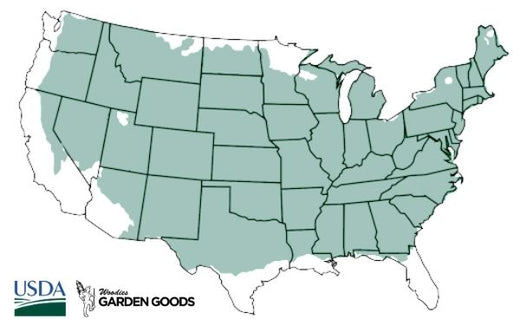
| Hardiness Zone: | 4-8 |
|---|---|
| Mature Height: | 3 to 6 Feet |
| Mature Width: | 3 to 6 Feet |
| Classification: | Deciduous shrub |
| Sunlight: | Full sun to part sun |
| Habit: | Deciduous, multi-stemmed clump forming |
| Flower Color: | White flowers in mid to late spring through early summer |
| Foliage: | New growth emerges a dark green, changing to purple and yellow in the fall |
| Soil Condition: | Any well drained soil but will tolerate "wet feet" |
| Water Requirements: | Water well until established |
| Uses: | Pollinizer for Berry Heavy and Red Sprite Female Winterberry Hollies |
How to Care for Jim Dandy Winterberry Holly
Before you buy an Jim Dandy Winterberry Holly, make sure to read about the recommended care instructions to keep your plant healthy and thriving.
How Do I Plant A Jim Dandy Winterberry Holly?
To plant a Jim Dandy Winterberry Holly, start by selecting an appropriate location in your garden. This shrub thrives in full sun to partial shade, so choose a spot that receives at least 4-6 hours of direct sunlight each day. Ensure the soil is slightly acidic, well-drained, and moisture-retentive, as winterberries prefer damp conditions and can even tolerate areas with poor drainage. Begin by digging a hole twice as wide and the same depth as the root ball. Loosen the soil at the bottom of the hole to allow the roots to establish easily. Place the Jim Dandy Winterberry in the hole, making sure that the top of the root ball is level with the soil surface. Fill in around the root ball with the dug-out soil, and gently tamp it down to remove air pockets. Water thoroughly after planting to help the shrub settle in its new environment. After planting your Jim Dandy Winterberry Holly, apply a 2-3 inch layer of organic mulch around the base to retain moisture and regulate soil temperature. Be careful to leave a gap around the trunk to prevent moisture buildup that could lead to rot. Regular watering is crucial during the first year to help the shrub establish its root system—especially during dry periods. To encourage better growth, consider planting female winterberry hollies, such as the Red Sprite Winterberry, nearby since Jim Dandy serves as a pollinator for these plants, ensuring an abundance of colorful berries. Space Jim Dandy about 3-6 feet apart from the female shrubs to allow for proper pollination and airflow. With these simple steps, your Jim Dandy Winterberry Holly will establish itself successfully and enhance your landscape for years to come.
How Do I Water A Jim Dandy Winterberry Holly?
To water a Jim Dandy Winterberry Holly, it’s important to keep the soil consistently moist, especially during the first year after planting, as this helps establish a strong root system. Water your Jim Dandy deeply once or twice a week, depending on rainfall, ensuring that the moisture reaches the roots. The key is to maintain an even level of moisture without allowing the soil to become waterlogged. This holly variety can tolerate wet conditions, making it ideal for planting in areas with poor drainage, but you should avoid allowing it to sit in standing water for extended periods. Using a soaker hose or drip irrigation is a great way to provide steady moisture while reducing evaporation. Once the Jim Dandy Winterberry Holly is established, it becomes more drought-tolerant but will still benefit from regular watering during dry spells, particularly in the summer. To determine if your plant needs water, check the top two inches of soil—if it feels dry, it’s time to water. Mulching around the base of the shrub with a 2-3 inch layer of organic material such as shredded bark or straw will help retain moisture, reduce the frequency of watering, and prevent weeds. Always be sure to water at the base of the plant to minimize the risk of leaf diseases and allow the roots to absorb as much moisture as possible. Following these guidelines will help your Jim Dandy Winterberry Holly thrive and support the health and vigor of any female winterberry shrubs in your garden.
How Do I Fertilize A Jim Dandy Winterberry Holly?
To fertilize a Jim Dandy Winterberry Holly, it’s best to start in early spring, just before new growth begins. Use a balanced, slow-release fertilizer, such as a 10-10-10 or 12-6-6 formula, to ensure your plant receives the essential nutrients it needs for healthy development. Apply the fertilizer around the base of the shrub, but be careful not to let it touch the trunk to avoid burning. Spread it evenly in a circle around the drip line, where the shrub's outer branches extend. After applying the fertilizer, water the area thoroughly to help the nutrients penetrate the soil and reach the root system of your Jim Dandy Winterberry. If your soil is naturally acidic, Jim Dandy Winterberry Holly will thrive without needing heavy fertilization. It’s a good idea to test your soil's pH before fertilizing, as winterberries prefer slightly acidic soil with a pH between 5.0 and 6.5. If your soil is too alkaline, consider adding elemental sulfur to lower the pH gradually. Organic fertilizers, such as compost or well-rotted manure, can also be beneficial for boosting soil quality and providing a gentle nutrient supply throughout the growing season. Avoid over-fertilizing, as this can lead to excessive leaf growth at the expense of flowering and pollination. With the right fertilization routine, your Jim Dandy Winterberry Holly will grow vigorously, providing necessary support to female winterberries for optimal berry production.

How Do I Prune A Jim Dandy Winterberry Holly?
To prune a Jim Dandy Winterberry Holly, it’s best to do so in late winter or early spring before new growth begins. This timing allows you to shape the shrub and remove any dead, damaged, or crossing branches without disrupting its natural growth pattern. Begin by inspecting the plant and cutting away any weak or broken stems at their base. Pruning helps maintain a healthy structure, improves air circulation, and encourages robust new growth. Use clean, sharp pruning shears to make precise cuts, and aim to maintain the natural shape of the shrub while removing any undesirable growth. Since Jim Dandy Winterberry Holly is a male pollinator, it doesn’t produce the ornamental berries that are typical of female winterberries, but proper pruning is still crucial to its overall health and effectiveness. Light pruning can also help to control the size of the shrub, especially if it's being grown in a smaller garden space. Avoid heavy pruning, as this can reduce the plant's ability to produce flowers that pollinate nearby female winterberries, such as the Red Sprite Winterberry. Instead, focus on keeping a well-balanced shape and thinning out the interior branches to allow sunlight to penetrate the canopy. Regular pruning will keep your Jim Dandy Winterberry healthy and ensure it continues to support berry production in your landscape.

